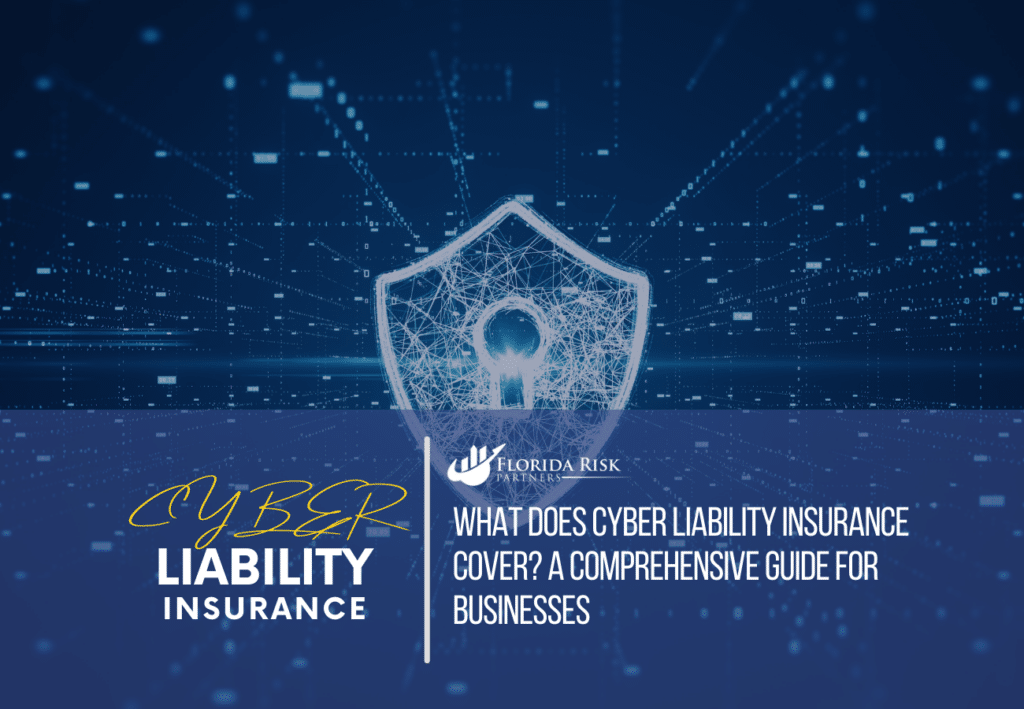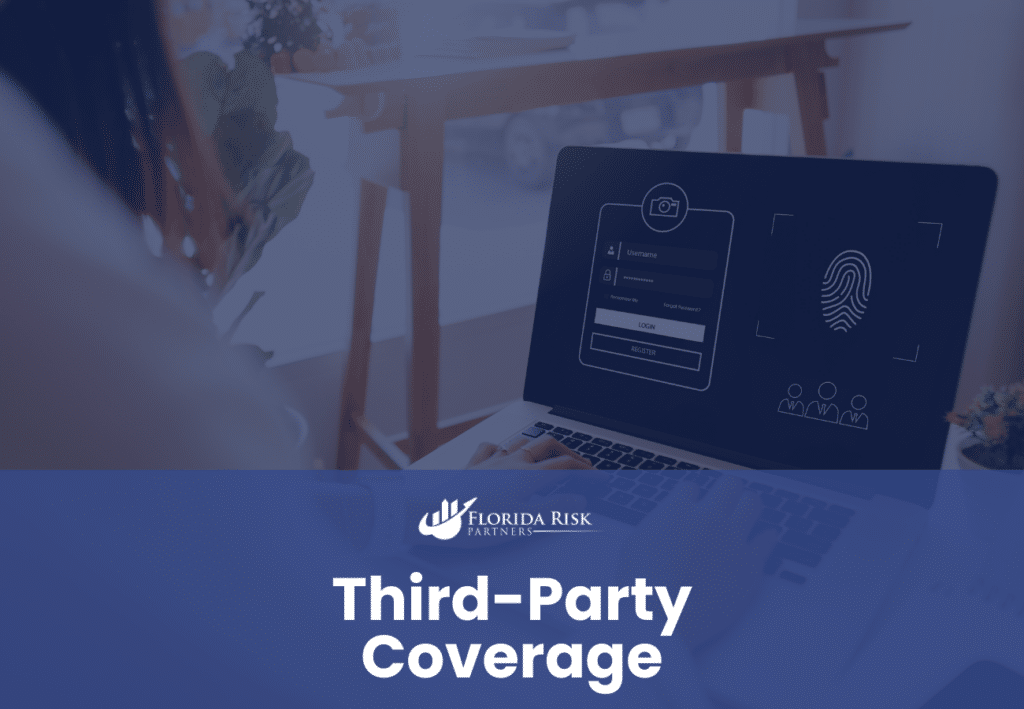-
Main Office: 1434 E. Bloomingdale Ave Valrico, FL 33596-6110
-
Phone: (888) 601-6660
-
Email: info@floridariskpartners.com

Businesses face increasing risks from cyber threats like data breaches, ransomware, and phishing attacks. The financial and operational impacts of these incidents can be devastating, especially for small and mid-sized businesses. This is where cyber liability insurance becomes a vital part of your risk management strategy. But what exactly does it cover, and how can it protect your business when disaster strikes?
This guide dives deep into the coverage provided by cyber liability insurance, helping you understand its critical role in safeguarding your business against the financial fallout of cyber incidents.
What is Cyber Liability Insurance?
Cyber liability insurance is a specialized form of business insurance that addresses the financial losses and liabilities arising from cyber incidents. Unlike traditional insurance policies, which focus on physical risks like property damage or bodily injury, cyber liability insurance is designed to cover digital risks, such as data breaches, ransomware attacks, and system outages.
This coverage is generally divided into two categories:
- First-party coverage, which protects your business from direct losses.
- Third-party coverage, which shields you from liabilities arising from claims made by others, such as customers or regulators.
First-Party Coverage
First-party coverage focuses on the costs your business incurs directly from a cyber incident. These expenses can quickly add up, making this component essential for recovery.
Data Breach Response Costs
When sensitive customer or employee information is exposed in a data breach, you may be legally required to notify affected individuals. This process often includes:
- Sending breach notification letters or emails.
- Offering credit monitoring services to mitigate the risk of identity theft.
- Hiring forensic experts to investigate the breach and determine its scope.
Why It Matters:
Breach notification costs alone can run into the tens of thousands of dollars, especially if you handle large amounts of customer data. Cyber liability insurance ensures you’re financially equipped to meet these obligations.
Business Interruption Losses
A cyberattack that disrupts your operations can lead to significant revenue losses. Whether it’s a ransomware attack that locks your systems or a DDoS attack that takes your website offline, the downtime can be costly.
Cyber liability insurance covers:
- Lost revenue during the period your business is unable to operate.
- Additional expenses incurred to minimize the disruption, such as renting temporary equipment or hiring contractors.
Why It Matters:
For small businesses, even a few days of downtime can have long-term financial consequences. Business interruption coverage ensures your financial stability during recovery.

Cyber Extortion and Ransomware Payments
Ransomware attacks have become one of the most common cyber threats, with hackers encrypting your data and demanding payment to release it. Cyber liability insurance can help cover:
- The cost of paying the ransom (where legally permitted).
- Fees for professional negotiators who work with attackers to resolve the situation.
- Expenses for restoring your systems and data after the attack.
Why It Matters:
Ransom demands often exceed $100,000, and paying them doesn’t guarantee your data will be restored. This coverage provides financial support to handle these high-stakes situations.
Data Restoration and Recovery
Recovering or recreating lost or corrupted data can be a time-consuming and expensive process. Cyber liability insurance helps cover the costs of:
- Restoring compromised files from backups.
- Rebuilding corrupted databases.
- Hiring IT professionals to repair your systems.
Why It Matters:
Quick recovery minimizes operational downtime and ensures your business can resume normal operations as soon as possible.
Crisis Management and Public Relations
A cyber incident can damage your reputation, leading to lost customers and reduced trust in your brand. Cyber liability insurance often includes funds for:
- Hiring public relations professionals to manage communications.
- Crafting messaging to reassure customers and stakeholders.
- Launching marketing campaigns to rebuild your brand.
Why It Matters:
Reputation is one of your business’s most valuable assets. Effective crisis management helps mitigate long-term reputational damage.
Third-Party Coverage
While first-party coverage focuses on your business, third-party coverage protects you from liabilities that arise when others are impacted by a cyber incident. This is especially important if you handle sensitive data or provide services to other businesses.
Legal Defense Costs
If a cyber incident exposes customer data or disrupts a client’s operations, you could face lawsuits. Cyber liability insurance covers:
- Attorney fees.
- Court costs.
- Settlements or damages awarded to plaintiffs.
Why It Matters:
Legal defense costs can quickly escalate, even if you’re not found liable. This coverage ensures you can defend your business without draining your resources.
Regulatory Fines and Penalties
Governments and regulatory bodies are increasingly holding businesses accountable for protecting sensitive data. If you fail to comply with data protection laws, such as GDPR or CCPA, you may face fines and penalties.
Cyber liability insurance can help cover:
- Fines imposed by regulatory authorities.
- Legal costs associated with regulatory investigations.

Why It Matters:
Regulatory penalties can run into the millions of dollars, especially for businesses handling large volumes of sensitive data. Compliance-related coverage helps protect your financial stability.
Settlement Payments
If your business is found liable for a cyber incident, you may need to compensate affected parties. Cyber liability insurance covers:
- Payments to settle lawsuits or claims.
- Damages awarded by courts.
Why It Matters:
These payments can be substantial, especially if a large number of individuals or businesses are affected by the incident.
Media Liability
If your online content inadvertently infringes on intellectual property rights or defames someone, you could face legal action. Media liability coverage protects against these claims.
Why It Matters:
In today’s digital landscape, businesses rely heavily on online content for marketing and operations. This coverage ensures you’re protected from legal risks related to your online presence.
Optional Endorsements to Consider
Many insurers offer optional endorsements to customize your policy based on your business’s specific risks. These include:
- Social Engineering Fraud: Covers losses from scams that trick employees into transferring funds or sharing sensitive information.
- Dependent Business Interruption: Protects against losses caused by outages at third-party vendors or partners.
- Reputation Damage Coverage: Provides funds to rebuild your brand after a cyber incident.
What Cyber Liability Insurance Does NOT Cover
While cyber liability insurance provides broad protection, it’s important to understand its limitations. Common exclusions include:
- Known Vulnerabilities: Incidents caused by unpatched software or ignored risks.
- Intentional Misconduct: Malicious actions by employees are typically excluded.
- Acts of War or Terrorism: Cyberattacks attributed to war or terrorism may not be covered.
Is Cyber Liability Insurance Right for Your Business?
If your business handles sensitive data, relies on digital systems, or interacts with third-party vendors, cyber liability insurance is an essential part of your risk management strategy. It provides the financial support needed to recover from a cyber incident and ensures you can continue serving your customers with confidence.
Download Our Complimentary Guide to Purchasing Cyberliability Insurance
Learn More About Cyber Liability Insurance
Cyber threats are an unavoidable reality in today’s world, but with the right coverage, you can protect your business from their potentially devastating consequences. To learn more about how cyber liability insurance can safeguard your business, read our comprehensive guide: The Complete Guide to Cyber Liability Insurance.
Call Us Or
Schedule an Appointment
Select an agent below to view our online calendars and select a day and time that works best for you or call us directly at 888-601-6660. When you use our online calendars, you will receive an email with more information.



